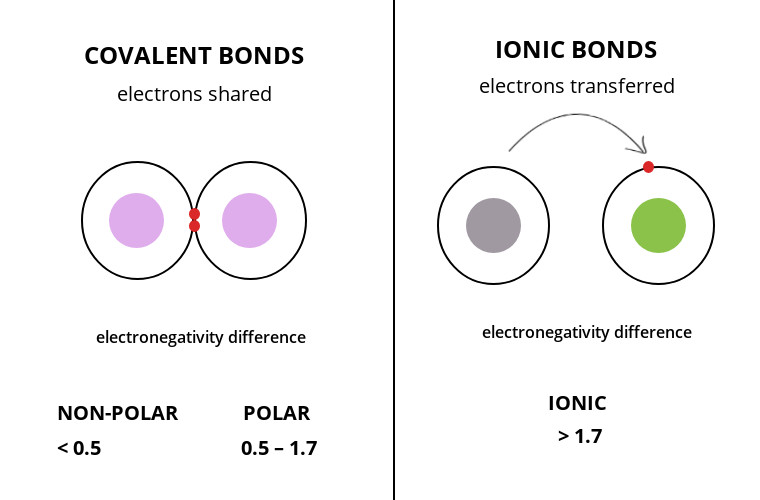Explain the Major Differences Between Covalent and Ionic Bonding
Oppositely charged ions that are attracted to each other are bound into molecules by ionic bonds giving and taking. A compound has the high melting point.
Difference Between Covalent And Ionic Bonds
In a true covalent bond If.

. The main reason for these differences is the difference in their bonding pattern. In covalent bonds atoms are electrostatically attracted within the. One atom or molecule donates one or more electrons to.
Describe the differences between the three types of bonding. 7 rows Ionic and covalent bonds are fundamentally different in the way they are formed. In a covalent bond the atoms are bound by the sharing of electrons.
Covalent bonds involve sharing. Formed by transfer of an electron from one atom to another. Explain the differences between ionic and covalent bonds by answering the following questions.
The main difference between covalent and ionic bonds is that ionic bonds occur between two species which are electrostatically attracted towards each other whereas covalent bonds occur covalently through the sharing of electrons between their outer shells. Ionic bond involves complete loss or gain of pair of electrons between two atoms whereas in covalent bond only sharing of electrons takes place. What is the name for N2F6.
9 rows Difference Between Ionic Covalent and Metallic bonds - The major difference between Ionic. -In an ionic bond the atoms are bound together by the attraction between oppositely-charged ions-In a covalent bond the atoms are bound by shared electrons. Ionic--there is electrostatic attraction between oppositely charged ions.
Ionic is losing and gaining electrons Covalent is sharing the same electrons Ionic - One atom loses and electron the other gains one and two oppositely charged ions are. Covalent--there is electron shari. Learn vocabulary terms and more with flashcards games and other study tools.
The difference between naming ionic covalent compounds Covalent Bonds Example. Core Difference Between Covalent and Ionic Bonds Covalent bond occurs when atoms share their outer shell electrons with each other while ionic bond occurs when one atom. The difference between ionic and covalent bond is that ionic bonds occur between atoms having very different electronegativities whereas covalent bonds occur between atoms.
Ionic bonding occurs between metal and non-metal. 222aThe main differences between the various forms of primary bonding are. What is the difference between ionic covalent and metallic bonding.
Formed by a sharing of electrons between two atoms. Start studying Difference Between Ionic and Covalent Bonds. Dinitrogen Hexafluoride Between two NONMETALS.
Atoms that participate in an ionic bond have different electronegativity values from each other. How do ionic bonds differ from covalent bonds when it comes to what happens to the. Hydrogen bonding involves bonding of.
Therefore their bonding pattern can be deemed as the key difference between ionic and. Ionic bonding occurs when transfer of electrons takes place. Explain the difference between ionic and covalent bonds.
The three different types of bonding are covalent ionic and metallic bonding. Covalent bonds occur between two non-metals metallic bonds is between two metals while ionic is observed between non-metal and metal. The difference between ionic and covalent bond is that ionic bonds occur between atoms having very different electronegativities whereas covalent bonds occur between atoms.
In general metallic elements tend to form ionic bonds and non-metallic elements tend to form covalent. The main difference between ionic bonds and covalent bonds is sharing of electron pairs and atoms. 7 rows An ionic bond essentially donates an electron to the other atom participating in the bond.

15 Major Difference Between Covalent And Ionic Bonds With Table Core Differences

Difference Between Ionic And Covalent Bonds Compare The Difference Between Similar Terms
What S The Difference Between An Ionic Bond And A Covalent Bond Quora
No comments for "Explain the Major Differences Between Covalent and Ionic Bonding"
Post a Comment